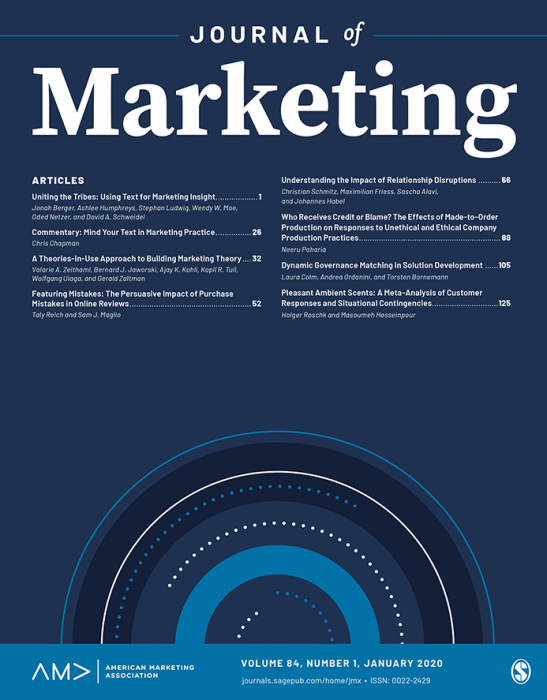市场营销学术的概念贡献:模式、机制和再平衡选择
IF 11.5
1区 管理学
Q1 BUSINESS
引用次数: 1
摘要
本文通过两个互补的研究分析了市场营销学术中概念贡献的性质和时间变化。首先,基于对1990年至2021年间发表在四大营销期刊上的5922篇文章的计算机辅助文本分析,我们使用麦金尼斯(2011)框架分析了概念贡献是如何随时间变化的。结果表明,在过去的三十年中,理论化的努力以牺牲“关联”和“辩论”为代价,强烈地支持“设想”和“解释”,这种不平衡随着时间的推移而增加。其次,通过对编辑、部门主管和作者的48次深度访谈,我们试图验证这些模式并揭示其潜在机制。我们的研究结果表明,在这个领域已经形成了一种流行的思维方式,这种思维方式由新颖性、清晰度和量化的研究理想所定义,它形成了一种集体观点,即作为作者、审稿人和导师的营销学者如何能为营销学术做出有价值的贡献。这种思维方式有利于设想和解释贡献,而不利于联系和辩论贡献。这两项研究共同指出了几种重新平衡的选择,可以在保持营销领域当前优势的同时,重振相关和辩论的贡献。本文章由计算机程序翻译,如有差异,请以英文原文为准。
EXPRESS: Conceptual Contributions in Marketing Scholarship: Patterns, Mechanisms, and Rebalancing Options
This article analyzes the nature and temporal change of conceptual contributions in marketing scholarship with two complementary studies. First, based on a computer-aided text analysis of 5,922 articles published in the four major marketing journals between 1990 and 2021, we analyze how conceptual contributions have changed over time using the MacInnis (2011) framework. Results indicate that over the past three decades, theorizing efforts have strongly favored “envisioning” and “explicating” at the expense of “relating” and “debating,” with this imbalance increasing over time. Second, drawing on 48 in-depth interviews with editors, department heads, and authors, we seek to validate these patterns and uncover their underlying mechanisms. Our findings indicate that a prevalent thought style has developed in the field—defined by the research ideals of novelty, clarity, and quantification—that shapes the collective view of how marketing scholars, in their roles as authors, reviewers, and mentors, can make a valuable contribution to marketing scholarship. This thought style favors envisioning and explicating contributions and disfavors relating and debating contributions. Jointly, the two studies point to several rebalancing options that can reinvigorate relating and debating contributions while preserving the current strengths of the marketing field.
求助全文
通过发布文献求助,成功后即可免费获取论文全文。
去求助
来源期刊

Journal of Marketing
BUSINESS-
CiteScore
24.10
自引率
5.40%
发文量
49
期刊介绍:
Founded in 1936,the Journal of Marketing (JM) serves as a premier outlet for substantive research in marketing. JM is dedicated to developing and disseminating knowledge about real-world marketing questions, catering to scholars, educators, managers, policy makers, consumers, and other global societal stakeholders. Over the years,JM has played a crucial role in shaping the content and boundaries of the marketing discipline.
 求助内容:
求助内容: 应助结果提醒方式:
应助结果提醒方式:


